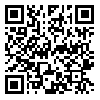Wed, Feb 18, 2026
| فارسی
Volume 30, Issue 1 (Continuously Updated 2024)
IJPCP 2024, 30(1): 0-0 |
Back to browse issues page
Download citation:
BibTeX | RIS | EndNote | Medlars | ProCite | Reference Manager | RefWorks
Send citation to:



BibTeX | RIS | EndNote | Medlars | ProCite | Reference Manager | RefWorks
Send citation to:
Malekpour N, Behrozian F, Najafi N, Mousavi Asl E. Investigating the Mediating Role of Shame and Self-criticism in the Relationship Between Early Life Experiences and Paranoid Ideation in Iranian College Students. IJPCP 2024; 30 (1) : 2146.3
URL: http://ijpcp.iums.ac.ir/article-1-4203-en.html
URL: http://ijpcp.iums.ac.ir/article-1-4203-en.html
1- Department of Psychiatry, School of Medicine, Golestan Hospital, Ahvaz Jundishapur University of Medical Sciences, Ahvaz, Iran.
2- Department of Psychiatry, School of Medicine, Golestan Hospital, Ahvaz Jundishapur University of Medical Sciences, Ahvaz, Iran. ,seyedesmaeilmousaviasl@gmail.com
2- Department of Psychiatry, School of Medicine, Golestan Hospital, Ahvaz Jundishapur University of Medical Sciences, Ahvaz, Iran. ,
Abstract: (2195 Views)
Objectives The prevalence of paranoid ideation in the general population raises questions about the factors that contribute to severe or clinical paranoia. The present study aims to investigate the mediating role of shame and self-criticism in the relationship between early life experiences and paranoid ideation in Iranian college students.
Methods This is a correlational study using structural equation modeling (SEM). Participants were 272 students of Ahvaz Jundishapur University of Medical Sciences in Ahvaz, Iran, who were selected by a convenience sampling method. They completed the Early Life Experiences Scale, Green et al.’s Paranoid Thoughts Scale-8 item, the External and Internal Shame Scale, and the Forms of Self-Criticizing/Attacking & Self-Reassuring Scale-Short-Form. To analyze the data, the Pearson correlation test and SEM were performed in SPSS software, version 24 and LISERL software, version 8.80. The Bootstrap test was used to assess the indirect effects.
Results Paranoid ideation had a positive and significant relationship with shame (r=0.56, P=0.01), self-criticism (r=0.31, P=0.01), and early life experiences (r=0.51, P=0.01). The indirect relationship between early life experiences and paranoid ideation was also significant through shame, with a standard path coefficient of 0.25 (P<0.05). However, indirect relationship between early life experiences and paranoid ideation through self-criticism was not significant (P>0.05).
Conclusion Shame and self-criticism can mediate the relationship between early life experiences and paranoid ideation in Iranian college students. Therefore, the variables of shame and self-criticism should be considered in developing therapeutic interventions for people with paranoid thoughts.
Methods This is a correlational study using structural equation modeling (SEM). Participants were 272 students of Ahvaz Jundishapur University of Medical Sciences in Ahvaz, Iran, who were selected by a convenience sampling method. They completed the Early Life Experiences Scale, Green et al.’s Paranoid Thoughts Scale-8 item, the External and Internal Shame Scale, and the Forms of Self-Criticizing/Attacking & Self-Reassuring Scale-Short-Form. To analyze the data, the Pearson correlation test and SEM were performed in SPSS software, version 24 and LISERL software, version 8.80. The Bootstrap test was used to assess the indirect effects.
Results Paranoid ideation had a positive and significant relationship with shame (r=0.56, P=0.01), self-criticism (r=0.31, P=0.01), and early life experiences (r=0.51, P=0.01). The indirect relationship between early life experiences and paranoid ideation was also significant through shame, with a standard path coefficient of 0.25 (P<0.05). However, indirect relationship between early life experiences and paranoid ideation through self-criticism was not significant (P>0.05).
Conclusion Shame and self-criticism can mediate the relationship between early life experiences and paranoid ideation in Iranian college students. Therefore, the variables of shame and self-criticism should be considered in developing therapeutic interventions for people with paranoid thoughts.
Article number: 2146.3
Type of Study: Original Research |
Subject:
Psychiatry and Psychology
Received: 2024/06/23 | Accepted: 2024/10/21 | Published: 2024/07/31
Received: 2024/06/23 | Accepted: 2024/10/21 | Published: 2024/07/31
| Rights and permissions | |
 |
This work is licensed under a Creative Commons Attribution-NonCommercial 4.0 International License. |






